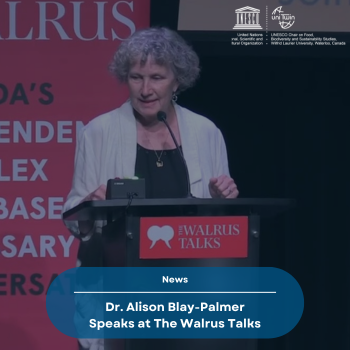We use cookies on this site to enhance your experience.
By selecting “Accept” and continuing to use this website, you consent to the use of cookies.

The Walrus Talks is a national ideas-focused series that sparks critical conversations on issues shaping Canadian society. On September 23, 2025, The Walrus hosted The Power of Animals, a conversation dedicated to exploring the ethical, environmental, and scientific dimensions of animal welfare in Canada and worldwide. This event brought together seven expert speakers from diverse fields, including policy, health, Indigenous leadership, animal protection, and sustainability. Each delivered a seven-minute talk examining how the treatment of animals is intrinsically connected to environmental conservation, public health, and the future of food systems.
Among the speakers was Dr. Alison Blay-Palmer, UNESCO Chair on Food, Biodiversity, and Sustainability Studies. Dr. Blay-Palmer explored how transforming food systems requires acknowledging both the harm caused by industrial agriculture and the potential of alternative, local models that empower communities, ecosystems, and animals.
Dr. Blay-Palmer opened the conservation by emphasizing that although today’s global food systems are driving ecological and social harm, there are viable alternatives that offer hope towards more just and sustainable food systems. By reframing food around diversity, resilience, and local and Indigenous knowledge, communities can create systems that sustain both people and the planet.
She illustrated this through a family farm in Brazil’s Atlantic Forest, where traditional practices have been passed down through generations. Erva-mate trees grow in the shade as chickens and pigs forage freely, enriching the soil and supporting a thriving garden that feeds the family and their neighbors. The shade-grown erva-mate is sold through cooperatives to regional and fair-trade markets, creating a closed-loop system that integrates animals, plants, community, and the environment. This example shows how locally rooted, integrated food systems can foster environmental balance and strong local livelihoods.
Dr. Blay-Palmer concluded by inspiring the audience to drive change by:Watch Dr. Alison Blay-Palmer’s full talk here.